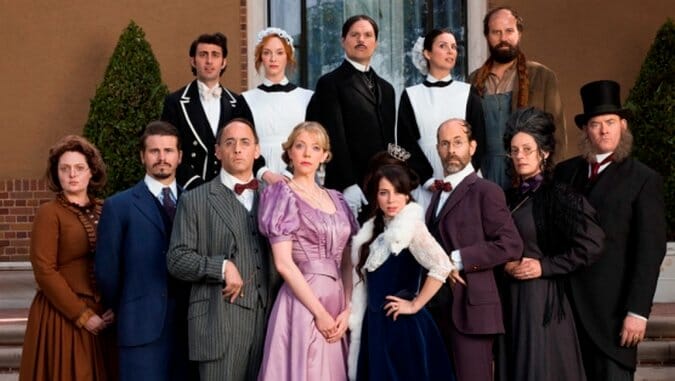Another Period: “Pilot”

At the outset, Another Period seems to be a spoof of Downton Abbey, because of its upstairs/downstairs motif. Yet, underneath all the pomp and circumstance of a period drama lies a biting satire about reality TV, one which points its damning quill at everything from Real Housewives of whatever county to Keeping Up with the Kardashians. In fact, it’s the latter series that seems to provide the strongest undercurrent for Another Period’s storyline. With three sisters (one hated for not being as beautiful as the other two), a brother, and a controlling mother, it’s easy to draw parallels between Another Period and Keeping Up with the Kardashians. The show clearly has fun making fun of contemporary wealth and all its trappings. That kind of wealth, as well as the attitudes, expectations and reality shows it often breeds, becomes the fodder for the first episode.
Created by Natasha Legero (from Burning Love) and Riki Lindhome (from Garfunkel and Oates), Another Period follows the lives of the well-to-do Bellacourts, who live in turn of the century Newport. Their father, the Commodore (David Koechner), is a magnet magnate. After learning that their best friends the Claudette sisters have died of tuberculosis, scheming sisters Lillian (Legero) and Beatrice (Lindhome) see a way into their dream of being part of the “Newport 400,” aka “the 400 most important white people in all of America.” That sets into motion an idea to host a party for the Marquis de Sainsbury (Thomas Lennon), who heads the club and will be the deciding factor as to whether the Bellacourt sisters make it in.
As the sisters go about making preparations for their illustrious guest, which include making sure their massive bushes have been recently perfumed (it is the 1900’s after all and personal grooming “down there” had not yet found a friend in the razor or the wax strip), a new servant girl arrives. Of all the characters, Celine (Christina Hendricks) serves as the foil to the hyperbolic antics that run amuck both upstairs and downstairs. A sweet, quiet servant girl, her moniker doesn’t jive well with the family Bellacourt. After meeting Celine in the hallway, where the family’s butler Mr. Peepers (Michael Ian Black) introduces her, the family agrees “Celine” is a mite too fancy for her station. Lillian, holding a Chihuahua with a curly golden doll’s wig named Mayor Cutie, suggests “Barb.” Her mother, Dodo Bellacourt (Paget Brewster), doesn’t agree, since she once had a cat named Barb. They finally land on renaming her “Chair” after Beatrice sees a chair sitting in the hallway.
It’s this kind of foolish humor that punctuates the pilot most often. The show struggles to find its footing in the pilot, but there are glimpses of hope in between the more inane jokes. Walking the line between period drama and reality TV show, it uses that middle ground to make fun of the issues that affected people at the time (hysteria, morphine addiction), as well as the significant distinction existent between upper-class wealth and their lower-class servants. When Mr. Peepers takes Celine downstairs to the servant’s quarters and introduces her to her room, a dark, barren cell with only a bed, he informs her, “This is where you’ll be living if you play your cards right for the next 40 years, alone.”